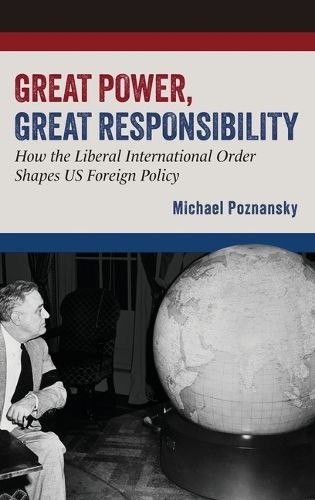Readings Newsletter
Become a Readings Member to make your shopping experience even easier.
Sign in or sign up for free!
You’re not far away from qualifying for FREE standard shipping within Australia
You’ve qualified for FREE standard shipping within Australia
The cart is loading…






In the wake of World War II, the United States leveraged its hegemonic position in the international political system to gradually build a new global order centered around democracy, the expansion of free market capitalism, and the containment of communism. Named in retrospect the "liberal international order" (LIO), the system took decades to build and is still largely with us today even as the US's relative power within it has diminished.In Great Power, Great Responsibility, Michael Poznansky explores how the LIO has influenced US foreign policy from its founding to the present. Proponents argue that its impact has been profound, producing a system that has been more rule-bound and beneficial than any previous order. Critics charge that it has failed to prevent the US itself from consistently violating rules and norms. Poznansky contends that the answer lies in-between. While rule-breaking has been a constant feature of the postwar order, the nature of violations varies in surprising and poorly understood ways. America's approach to compliance with the LIO, including whether leaders feel the need to conceal rule violations at all, is a function of two primary factors: the intensity of competition over international order; and the burden of complying with the liberal order's core tenets in a given case.Drawing on nine case studies, including the Korean War and Iraq War, Great Power, Great Responsibility sheds important light on the future of US foreign policy in an era where American unipolarity has ended and great power rivalry has returned.
$9.00 standard shipping within Australia
FREE standard shipping within Australia for orders over $100.00
Express & International shipping calculated at checkout
Stock availability can be subject to change without notice. We recommend calling the shop or contacting our online team to check availability of low stock items. Please see our Shopping Online page for more details.
In the wake of World War II, the United States leveraged its hegemonic position in the international political system to gradually build a new global order centered around democracy, the expansion of free market capitalism, and the containment of communism. Named in retrospect the "liberal international order" (LIO), the system took decades to build and is still largely with us today even as the US's relative power within it has diminished.In Great Power, Great Responsibility, Michael Poznansky explores how the LIO has influenced US foreign policy from its founding to the present. Proponents argue that its impact has been profound, producing a system that has been more rule-bound and beneficial than any previous order. Critics charge that it has failed to prevent the US itself from consistently violating rules and norms. Poznansky contends that the answer lies in-between. While rule-breaking has been a constant feature of the postwar order, the nature of violations varies in surprising and poorly understood ways. America's approach to compliance with the LIO, including whether leaders feel the need to conceal rule violations at all, is a function of two primary factors: the intensity of competition over international order; and the burden of complying with the liberal order's core tenets in a given case.Drawing on nine case studies, including the Korean War and Iraq War, Great Power, Great Responsibility sheds important light on the future of US foreign policy in an era where American unipolarity has ended and great power rivalry has returned.